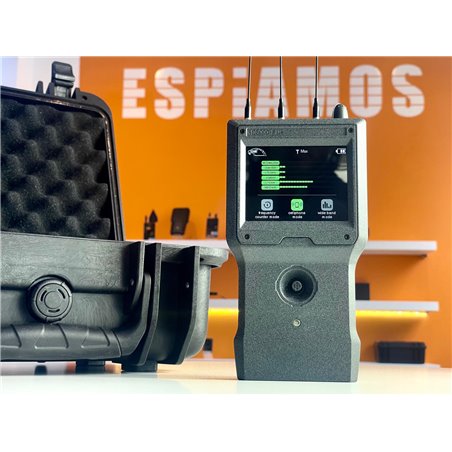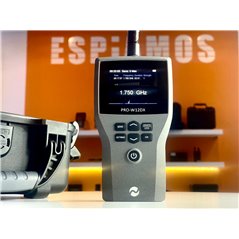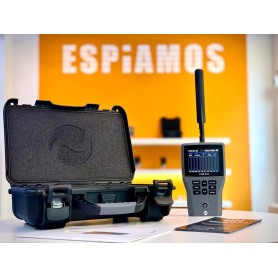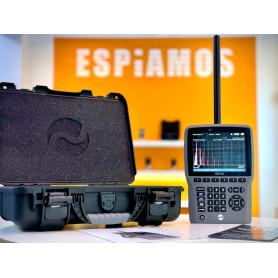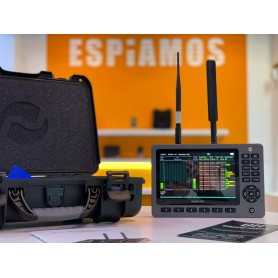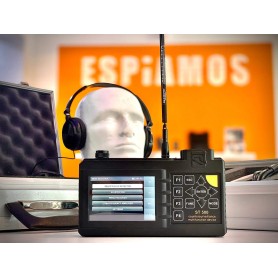
GPS Tracker Detector: Effective Protection Against Hidden Trackers
A GPS tracker detector is a specialized device that allows you to quickly identify and locate any hidden tracker in vehicles or personal belongings. Its main purpose is to guarantee your privacy by preventing unauthorized tracking using hidden or clandestinely installed GPS trackers. These detectors are essential for individuals, businesses, or professionals who need to ensure they are not being monitored or tracked without their knowledge.
These detectors operate in a simple yet highly effective way. When activated, they search for specific signals emitted by hidden GPS trackers, whether continuous or intermittent. Upon detecting the signal, the device emits visual, audible, or vibrating alerts that make it easy to pinpoint the exact location of the tracker, allowing you to remove it immediately and guarantee your safety and privacy.
Among the key advantages of using a dedicated GPS tracker detector are rapid threat identification, accurate location of the hidden device, and the peace of mind of knowing your vehicle or belongings are safe from unauthorized tracking. Additionally, these detectors feature advanced features such as adjustable sensitivity, GSM signal detection, and short data transmissions, ensuring optimal results and maximum effectiveness in any situation.
Main Applications of GPS Tracker Detector
- Vehicle Protection: Essential to ensure your car, motorcycle, or company vehicle is not being illegally tracked, quickly detecting any hidden GPS devices.
- Business Security: An essential tool for companies with fleets of vehicles that need to ensure their business operations are private and confidential, preventing corporate espionage.
- Personal Security: Ideal for individuals concerned about their personal privacy, allowing them to periodically check for the presence of hidden devices in vehicles, backpacks, or personal items.
- TSCM Professional Sweeps: Widely used by security and counterintelligence professionals to detect clandestine GPS devices during comprehensive inspections of vehicles or important assets.
Types and Features of GPS Tracker Detectors
There are different types of detectors specifically designed to locate GPS devices, each with specific functions tailored to different security and surveillance needs. Here we highlight the main models available, along with their most important features:
- Portable GPS Detectors: These compact devices are ideal for quick checks of cars, motorcycles, or luggage, offering maximum portability and ease of use, with clear alerts when identifying suspicious GPS signals.
- Professional GPS Tracker Detectors: Advanced equipment for professional use in security and counterintelligence, with adjustable sensitivity to identify even weak signals or sophisticated devices, ideal for conducting thorough inspections.
- Multifunctional GPS-GSM Detectors: They can detect both GPS and GSM signals, ideal for identifying advanced devices that send positions via mobile networks, providing more complete and secure detection.
- Magnetic and Magnetic Field GPS Detectors: Specialized in locating GPS devices magnetically attached to vehicles or hidden in metal cavities, facilitating fast and effective scanning of private or business vehicles.
When choosing a GPS tracker detector, consider key factors such as accuracy and sensitivity, ease of use, the type of signals detected, and the device's battery life. These features ensure effective scanning and comprehensive protection against unauthorized trackers.
Where to Buy a Professional GPS Tracker Detector?
ESPIAMOS® is the leading choice for professional GPS tracker detectors, guaranteeing quality, safety, and absolute effectiveness. Our specialization in anti-spy devices allows us to offer exclusive advantages that set us apart:
- Specialized Technical Advice: We guide you throughout the entire purchasing process, ensuring that you acquire the detector best suited to your specific needs.
- Full 3-Year Warranty: All of our detectors come with an extended warranty, giving you complete confidence and peace of mind with your investment.
- Fast, Free, and Confidential Shipping: We offer free and discreet shipping within Spain, ensuring absolute privacy from purchase to delivery.
- Absolute Payment Privacy: We rigorously protect your data, reflecting only “HID” on your bank statement for maximum discretion.
- Permanent Stock and Immediate Delivery: We have a large inventory of detectors, allowing for rapid shipments so you can begin your security inspections as soon as possible.
Explore our catalog of GPS tracker detectors and effectively protect your privacy with the guarantee and experience of ESPIAMOS®.
Frequently Asked Questions about GPS Tracker Detectors
What signals does a GPS tracker detector detect?
A GPS tracker detector primarily identifies signals emitted by real-time tracking devices. These can be transmissions over mobile networks (GSM, 2G, 3G, 4G), radio frequency signals, or, in some advanced models, even short pulses used by passive beacons. Some devices also detect magnetic fields if the tracker is attached to the vehicle using magnets. This type of detection allows for the rapid location of hidden devices, whether active or at rest, ensuring a complete scan of the surroundings. It is advisable to choose a detector with adjustable sensitivity to better adapt to different types of signals and avoid false alarms.
Is it possible to detect a GPS that is off or in standby mode?
Detecting a GPS tracker that's turned off is more complex, as these devices don't emit active signals. However, there are detectors that analyze the presence of magnetic fields or alterations in metal surfaces, allowing a tracker to be physically located even if it's inactive. Some professional models include sensors that help detect passive or timed beacons that only transmit occasionally. In any case, to achieve a complete inspection, it's recommended to combine electronic detection with a physical inspection of the vehicle or luggage, paying special attention to areas prone to concealment such as wheel arches or dashboards.
How often should a vehicle be inspected with a GPS detector?
The frequency of use of a GPS detector depends on the level of risk exposure. If surveillance is suspected or if the vehicle belongs to a company, it is advisable to perform weekly inspections or before any major trip. In personal environments with less exposure, a monthly check may be sufficient as a preventative measure. It is also advisable to use the detector after visits to the garage, unusual movements, or unscheduled changes in the vehicle's behavior. Performing periodic sweeps helps maintain privacy and allows any attempt to install trackers to be detected early.
Where are GPS trackers usually hidden in cars?
GPS trackers are usually placed in discreet, accessible but hidden locations within the vehicle. Common locations include the wheel arches, inside the bumper, under the chassis, inside the engine compartment, or behind trunk panels. They can also be hidden in dashboard compartments or behind upholstery. Some models are magnetic and adhere easily to metal surfaces. Therefore, when using a GPS tracker detector, it is important to carefully inspect the exterior and interior areas of the car, preferably with a flashlight and a mirror to reach hard-to-reach areas.
What is the difference between a GPS detector and a conventional frequency detector?
Although both devices may look similar, a GPS tracker detector is optimized to specifically identify the signals used by tracking devices. This includes periodic data transmissions, GSM transmissions, or satellite pings. In contrast, a conventional frequency detector is designed for a broader spectrum, including wireless cameras, spy microphones, and other transmitters. While conventional detectors are more versatile, GPS detectors offer greater accuracy in locating tracking devices, especially those hidden in vehicles. In vehicle security contexts, it's recommended to use a GPS tracker-specific detector for best results.






 WhatsApp
WhatsApp Telegram
Telegram




